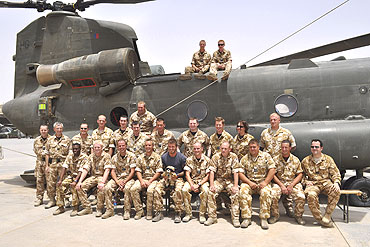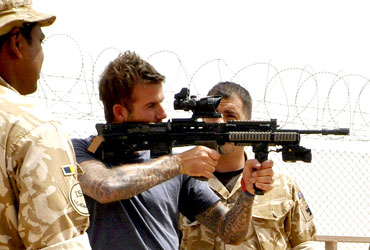
David Beckham met soldiers returning from the frontline as he continued his visit to British troops in Afghanistan.
The former England captain met six members of 1st Battalion The Duke of Lancaster's Regiment as they arrived back in Camp Bastion.
Beckham also met 'dogs of war' at the Theatre Military Working Dogs HQ and was "attacked" by a German shepherd called Brit. The footballer, dressed in a well-padded suit with a baseball type helmet, taunted the dog, which then plunged its teeth into his protected back, with no harmful effects.
The base's 51 dogs, including German shepherds, spaniels, Labradors and Belgian shepherds are used to aid operations by searching for explosives, carrying out vehicle searches and acting as guard dogs.

Beckham visited the Unmanned Aerial Vehicle (UAV) HQ where he was shown how unmanned aircraft, drones, patrolled the skies capturing real-time film of possible enemy movement on the ground. He joined 903 EAW (Expeditionary Air Wing), the team managing Bastion airfield.
As Vice President and Ambassador of the World Cup bid 2018, Beckham handed in England's official bid book to Fifa in Zurich and has distributed 'Back the Bid' badges to the troops he met.
Britain has around 10,000 troops in Afghanistan as part of an international force, largely fighting the Taliban in Helmand.
The country has lost 285 personnel since operations began in 2001.